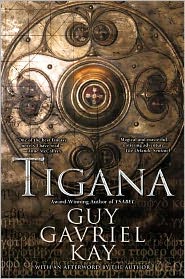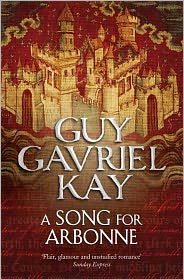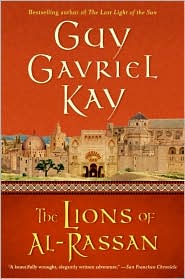Throwback Thursday: Guy Gavriel Kay and the Intimate Historical Epic
 I was never supposed to find Guy Gavriel Kay. I was 16 or so, it was a Saturday, and I had entered the bookstore with a plan—find and devour whatever David Eddings book was next in line—when my eye happened upon Tigana. I opened it, and promptly forgot about the existence of any sort of plan. I quickly read it, and every Kay book I could get my hands on, and then read them all over again. Twice. (And for “twice,” you should probably substitute much higher and more embarrassing number.) Needless to say, he’s a favorite author of mine.
I was never supposed to find Guy Gavriel Kay. I was 16 or so, it was a Saturday, and I had entered the bookstore with a plan—find and devour whatever David Eddings book was next in line—when my eye happened upon Tigana. I opened it, and promptly forgot about the existence of any sort of plan. I quickly read it, and every Kay book I could get my hands on, and then read them all over again. Twice. (And for “twice,” you should probably substitute much higher and more embarrassing number.) Needless to say, he’s a favorite author of mine.
Kay specializes in writing stories set in worlds that are almost our own. His proudly sources ancient myths and historical periods filled with bloody conflict, devout religious beliefs, tragic backstories, and momentous change. Magic, gods, and the not-quite-altogether-explainable are always there in some form, which is why the books are lumped in with other fantasy novels, but for the most part, they play it as straight as any Hollywood historical epic. What really sets him apart are his characters. He pulls back the curtain on familiar historical archetypes without pulling their statues down off pedestals. Instead, he invites us to step up onto them and see things from the point of view of the gods, maintaining the atmosphere of awe and enchantment appropriate for a tale of queens, generals, music makers, and world changers, while also building them into three-dimensional characters worth connecting with.
If you’ve never read Kay, first, you must, and second, I recommend you start with one of the ones I’ve highlighted below. Of all of his works, these three have stayed with me.
Tigana: Anniversary Edition
Tigana: Anniversary Edition
In Stock Online
Paperback $22.00
Tigana
Tigana’s world is based on Renaissance Italy, an society divided into squabbling city-states. The story picks up twenty years after the systematic conquering and division of eight provinces of a fertile peninsula by two empires, now circling and skirmishing with each other. But although the conquerors’ moves and countermoves provide the driving force of the plot (and at least one of them is the reason for the book’s most heartbreaking storyline), Kay’s focus is on elucidating the psychology of the conquered. He tells the story from a myriad of perspectives: visionaries willing their better world into existence; angry, deposed ruling families who want blood in the streets; ordinary people affected by the million-and-a-half kinds of abuse possible under autocracies. But the heart of the tale is Tigana itself, a country that was not only conquered, but utterly and completely erased from the memory of anyone not a native-born via the sorcery of a king distraught at the death of his favorite son. In the end, it becomes even more than a genre-transcending war epic: It is an enthralling discussion of the value and the burdens of memory, what is owed to it, and why.
Tigana
Tigana’s world is based on Renaissance Italy, an society divided into squabbling city-states. The story picks up twenty years after the systematic conquering and division of eight provinces of a fertile peninsula by two empires, now circling and skirmishing with each other. But although the conquerors’ moves and countermoves provide the driving force of the plot (and at least one of them is the reason for the book’s most heartbreaking storyline), Kay’s focus is on elucidating the psychology of the conquered. He tells the story from a myriad of perspectives: visionaries willing their better world into existence; angry, deposed ruling families who want blood in the streets; ordinary people affected by the million-and-a-half kinds of abuse possible under autocracies. But the heart of the tale is Tigana itself, a country that was not only conquered, but utterly and completely erased from the memory of anyone not a native-born via the sorcery of a king distraught at the death of his favorite son. In the end, it becomes even more than a genre-transcending war epic: It is an enthralling discussion of the value and the burdens of memory, what is owed to it, and why.
Song for Arbonne
Song for Arbonne
Paperback $10.75
A Song for Arbonne
Arbonne is an idealized version of medieval France, complete with troubadours, knights, and ladies fair. Our anchor here is a hardened mercenary from the north, fleeing from a mysterious past, who finds himself mixed up the power politics of the court. Entrenched blood feuds and personal vendettas among the powerful threaten to destabilize this rich and still-peaceful country, which may not be able to present a united front as it is slowly maneuvered into a vulnerable position, open to attack by its scheming neighbors. Kay moves us steadily through the gathering storm, gradually revealing the personal secrets and aspirations of his characters and showing how their personal journeys are often openly exploited for gain in court intrigue, where hereditary power means that nothing is personal. In stark contrast to many novels set in a quasi-medieval European environment, A Song for Arbonne is packed with interesting women playing the game of power (and succeeding). It is their choices, ultimately, that decide the fate of Arbonne.
A Song for Arbonne
Arbonne is an idealized version of medieval France, complete with troubadours, knights, and ladies fair. Our anchor here is a hardened mercenary from the north, fleeing from a mysterious past, who finds himself mixed up the power politics of the court. Entrenched blood feuds and personal vendettas among the powerful threaten to destabilize this rich and still-peaceful country, which may not be able to present a united front as it is slowly maneuvered into a vulnerable position, open to attack by its scheming neighbors. Kay moves us steadily through the gathering storm, gradually revealing the personal secrets and aspirations of his characters and showing how their personal journeys are often openly exploited for gain in court intrigue, where hereditary power means that nothing is personal. In stark contrast to many novels set in a quasi-medieval European environment, A Song for Arbonne is packed with interesting women playing the game of power (and succeeding). It is their choices, ultimately, that decide the fate of Arbonne.
The Lions of al-Rassan
The Lions of al-Rassan
In Stock Online
Paperback $19.99
The Lions of Al-Rassan
Al-Rassan, a somewhat optimistic sketch of a Moorish Spain, is a society of relative religious tolerance and wealth. However, the story opens after the collapse of its empire, with petty kings vying amongst themselves for supremacy, while neighboring Jaddite (read: Christian) armies wait for an excuse to declare holy war. The plot focuses on small group of outcasts from all three monotheistic religions, thrown together by circumstance. They form bonds across cultures at a time when it is much safer to burn people at the stake first and ask questions later. The book becomes about trying to remain a person when you know that very shortly you and your friends are going to have to choose sides, and you’re pretty sure there’s no way you can pick the same one. How much is a difference of opinion worth, whether religious, political, or personal? How much are you willing to give up for it? And have you really asked yourself why you’re doing it? Each one of Kay’s characters has to answer this question and live with the consequences of that choice.
Go forth and lose yourself in one of these enthralling, absorbing worlds! And do make sure to report back here and tell us which one you loved most!
The Lions of Al-Rassan
Al-Rassan, a somewhat optimistic sketch of a Moorish Spain, is a society of relative religious tolerance and wealth. However, the story opens after the collapse of its empire, with petty kings vying amongst themselves for supremacy, while neighboring Jaddite (read: Christian) armies wait for an excuse to declare holy war. The plot focuses on small group of outcasts from all three monotheistic religions, thrown together by circumstance. They form bonds across cultures at a time when it is much safer to burn people at the stake first and ask questions later. The book becomes about trying to remain a person when you know that very shortly you and your friends are going to have to choose sides, and you’re pretty sure there’s no way you can pick the same one. How much is a difference of opinion worth, whether religious, political, or personal? How much are you willing to give up for it? And have you really asked yourself why you’re doing it? Each one of Kay’s characters has to answer this question and live with the consequences of that choice.
Go forth and lose yourself in one of these enthralling, absorbing worlds! And do make sure to report back here and tell us which one you loved most!


